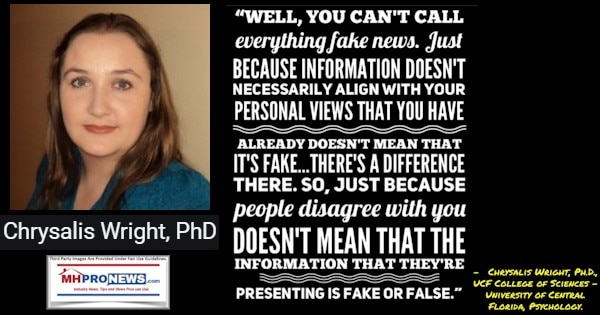
The Washington, D.C. based Manufactured Housing Association for Regulatory Reform (MHARR) continues to keep manufactured home professionals informed on topics that their larger rivals from across the Potomac River in Arlington, VA may fail to publicly convey, or do so in a distinctively different fashion. The Arlington based Manufactured Housing Institute (MHI) for weeks has been focused on the run-up to and their post-event self-congratulations exercise with respect to their 2022 “Congress and Expo” in Orlando, FL. While event attendence is of interest, how much more important are issues such as more competitive financing? Overcoming zoning and placement barriers? Or the looming and costly Department of Energy (DOE) manufactured housing energy rule? So precisely what has MHI achieved with respect to the issues raised by MHARR in their communique to the Biden White House, provided below?

April 26, 2022
VIA ELECTRONIC SUBMISSION
Manufactured Housing Task Force
White House Council on Environmental Quality
The White House
1600 Pennsylvania Avenue, N.W.
Washington, D.C. 20500
Re: Manufactured Housing Task Force – Further Listening Session Comments
Dear Sir or Madam:
The following second comments are submitted on behalf of the Manufactured Housing Association for Regulatory Reform (MHARR). MHARR is a Washington, D.C.-based national trade organization representing the views and interests of producers of manufactured housing subject to federal regulation by the U.S. Department of Housing and Urban Development (HUD) pursuant to the National Manufactured Housing Construction and Safety Standards Act of 1974 (1974 Act) as amended by the Manufactured Housing Improvement Act of 2000 (2000 reform law) (42 U.S.C. 5401, et seq.), and the U.S. Department of Energy (DOE) pursuant to section 413 of the Energy Independence and Security Act of 2007 (42 U.S.C. 17071). MHARR was founded in 1985. Its members include producers of manufactured housing located in all regions of the United States.
MHARR, as a national representative of federally-regulated manufactured housing producers, has been invited to participate in listening sessions being conducted by the federal Manufactured Housing Task Force (Task Force) established by the White House Council on Environmental Quality (CEQ). As enunciated in that invitation, the Task Force is slated to address, with stakeholders and relevant federal agencies, four issue areas affecting the manufactured housing market and the availability and utilization of manufactured housing as a source of inherently-affordable housing and homeownership for lower and moderate-income Americans. These include:
- The state of manufactured housing finance options and opportunities to enhance the lending market;
- Homebuyer counseling, consumer awareness and protections;
- The role of state and local governments to enhance the availability of manufactured housing as an affordable housing option; and
- The potential role for Community Development Finance Institutions, credit unions, and other mission-driven lenders to participate in the [manufactured housing] market.
The first three Task Force listening sessions have already been conducted. MHARR is deeply concerned, based on those sessions that the Task Force, instead of being focused on the accomplishment of President Biden’s policies and objectives with respect to the availability of affordable housing for lower and moderate-income Americans, and an equitable housing market for all Americans, will instead be used in a misguided and ultimately futile effort to mitigate the extreme cost impacts and related market exclusion that would result from pending federal manufactured housing “energy conservation” standards. Such standards, as detailed below, are entirely unnecessary and would inevitably harm lower and moderate-income Americans who rely on the current availability of HUD Code manufactured homes, irrespective of any policy “Band-Aids” that might be offered by the Task Force. Rather than acting as a fig-leaf for baseless, destructive and unnecessary federal energy standards, the Task Force should instead focus on the real issues that have – and continue to – constrain the availability of inherently affordable manufactured housing.
Given such a proper focus, and given the status of manufactured housing as the only segment of the housing industry to be regulated comprehensively at the federal level, the CEQ Task Force is uniquely positioned and has the unparalleled opportunity to both address and – more importantly – affirmatively rectify and remedy the matters assigned to it, involving baseless and discriminatory impediments, restrictions and limitations that have constrained and suppressed the manufactured housing market while, at the same time, needlessly excluding millions of Americans from the manifold benefits of homeownership. The one and only meaningful measure of success for the Task Force, accordingly, will not be in merely providing a forum for the discussion, debate and consideration of these issues, but in providing and ensuring concrete, productive solutions that will unleash the full economic vibrancy and potential of the industry to help solve the nation’s affordable housing crisis. Put differently, it is time for concrete action at the federal level to help manufactured housing help America, by reaching its full and unbounded potential as an affordable housing resource for millions of new homeowners.
MHARR has written extensively about the regulatory and policy-based impediments that have needlessly restricted the growth and evolution of the mainstream manufactured housing market, while the nation’s housing deficit, reported by Freddie Mac at the end of 2020 to be approximately 3.8 million homes — with an even more severe shortfall in the availability of affordable “starter homes” — has only intensified.[1] While these obstacles are not the only impediments faced by the industry and by consumers of affordable manufactured housing, they are both economically significant and endemic as demonstrated by the findings of a May 2021 study by the Consumer Financial Protection Bureau (CFPB).[2] These key obstacles – all affecting and impacting the industry’s post-production sector – are:
- The total absence of federal support for the manufactured home personal property (chattel) lending market, notwithstanding the “Duty to Serve” (DTS) directive of the Housing and Economic Recovery Act of 2008 (HERA), resulting in higher-than-market-competitive interest rates on the consumer loans which support nearly 80% of the manufactured housing market;
- Discriminatory and exclusionary zoning which prevents the placement of affordable manufactured homes in many jurisdictions and communities, including areas where affordable housing is most critically needed; and
- Impending federal energy standards, which are unnecessary and unnecessarily costly, and will needlessly exclude millions more Americans from the manufactured housing market.
MHARR, in its initial April 18, 2022, Task Force comments, has already addressed manufactured home personal property consumer lending. In these comments, MHARR will concentrate on the two other crucial issues that must be a focus for the Task Force and must be resolved for manufactured housing to reach its full and unbridled potential as a source of affordable housing and homeownership, particularly for lower and moderate-income Americans. While these additional issues – discriminatory and exclusionary zoning and pending excessive federal energy standards – are addressed briefly herein, much more extensive comments and related documentation have already been provided by MHARR to HUD and Congress with respect to discriminatory and exclusionary zoning; and to DOE with respect to baseless, costly and damaging “energy conservation” standards. MHARR stands ready to provide those additional materials to the Task Force upon request and to provide such other and further documents and information as may be helpful to the Task Force and its important mission.
- Discriminatory and Exclusionary Zoning
Beyond the failure of the Federal Housing Finance Agency (FHFA) and the Government Sponsored Enterprises (GSEs) to implement the statutory Duty to Serve mandate with respect to the personal property financing which serves the vast bulk of the mainstream manufactured housing market, as detailed in MHARR’s initial Task Force comments, discriminatory and exclusionary zoning mandates enforced by state and local governments have also acted to restrict the availability of affordable manufactured housing and the growth of the manufactured housing market. These mandates, which can exclude manufactured housing entirely or restrict manufactured housing to less desirable areas – typically based on negative perceptions regarding the “mobile homes” of yesteryear, rather than today’s modern, affordable manufactured housing — are especially prevalent in cities and other more densely-populated areas, where the need for affordable housing and homeownership is most pressing, and where the racially discriminatory impacts and consequences of housing and homeownership inequity are the most profound.
As a result of MHARR’s efforts, Congress was aware of the targeted exclusion of affordable HUD Code homes and manufactured homeowners when, in 2000, it substantially amended the federal law authorizing HUD’s regulation of the manufactured housing industry. While that original law, adopted in 1974, had always included a federal preemption provision, that provision, specifically referencing federal construction and safety standards, had been interpreted by HUD as not pertaining to the exclusion of HUD-regulated homes pursuant to state or local zoning authority. Subsequent to the advent of federal superintendence of the industry,[3] however, the discriminatory exclusion or restriction of manufactured housing had expanded significantly. Consequently, when the Act was amended by Congress in 2000, MHARR sought and obtained an expansion and clarification of the federal law’s preemption provision.[4]
In relevant part, the bipartisan amendments adopted by Congress in 2000 and signed into law by President Clinton, significantly expanded the scope and reach of federal preemption with respect to today’s modern, affordable manufactured housing and HUD’s regulation of the industry. In 2012 testimony before Congress, MHARR summarized these changes as follows:
The 2000 law expanded preemption three ways. It told HUD to apply preemption “broadly and liberally;”’ it extended preemption to state or local “requirements” that are not necessarily [construction or safety] standards; and it expanded the basis for preemption to include interference with the comprehensive federal “superintendence” of the industry. As a result, the touchstone of federal preemption is no longer limited to the extremely narrow, “same aspect of performance” test that HUD routinely used as an excuse not to enforce preemption under the 1974 law.
The most significant of these amendments for zoning and placement exclusion at the state and local level, is the extension of federal preemption, under the Act, to all types of state and local “requirements” affecting manufactured housing and HUD’s superintendence of the industry, including its obligation under the 1974 Act, as amended, to “facilitate the availability of affordable manufactured homes and to increase homeownership for all Americans.”[5] That the addition of the term “requirements” to the Act’s preemption authority was meant to expand its reach to exclusionary state and local zoning and placement “requirements” prohibiting or restricting the use and availability of HUD-regulated manufactured housing, was made absolutely clear by prominent congressional proponents of the 2000 law, including Rep. Barney Frank (D-MA), Rep. Maxine Waters (D-CA) and Rep. Bennie Thompson (D-MS), in a contemporaneous letter to HUD Secretary Mel Martinez.[6] In relevant part, that letter states:
… [T]he 2000 Act expressly provides, for the first time, for “federal preemption,” and states that this should be “broadly and liberally construed” to ensure that local “requirements” do not affect “federal superintendence of the manufactured housing industry.” Combined with the expansion of the findings and purposes of the Act to include for the first time the “availability of affordable manufactured homes,” the 2000 Act changes have transformed the Act from solely being a consumer protection law to also being an affordable housing law. More specifically, these combined changes have given HUD the legal authority to preempt local requirements or restrictions which discriminate against the siting of manufactured homes (compared to other single-family housing) simply because they are HUD Code homes. We ask that HUD use this authority … to address this issue….
(Emphasis added).
Given this expression of Congress’ bipartisan intent regarding the 2000 preemption amendments, there can and should be no doubt regarding HUD’s statutory authority to preempt and override the abuse of state and/or local zoning authority to exclude today’s modern, affordable, HUD-regulated manufactured homes and the lower and moderate-income Americans who rely on manufactured homes for affordable access to homeownership. Moreover, given the preponderance of racial minorities (and the elderly) among chattel-financed manufactured homebuyers – representing the vast bulk of new manufactured home purchases – as determined by CFPB, the invalidation of those exclusionary mandates would foster and promote racial equity in accordance with the preeminent policy priorities of President Biden and HUD’s equity objectives as expressed by Secretary Fudge at the April 14, 2022 White House Convening on Racial Equity.
By contrast, if HUD does not eliminate such state and local barriers to the placement of affordable manufactured homes, there is no level of federal spending or policy intervention that will have any meaningful affect or impact in increasing the availability of affordable manufactured homes. Indeed, as MHARR will detail in a soon-to-be-released White Paper, even current and existing federal affordable housing programs, which nominally include manufactured housing, have – and will continue – to fail to achieve economically-significant results “on the ground” because of ingrained official and institutional resistance to manufactured housing in many communities. Accordingly, the elimination of existing zoning and placement barriers is, in practical terms, a necessary predicate for the success of any supportive federal programs for manufactured homebuyers. The Task Force, therefore, should recommend that HUD finally – after 22 years – use the clear federal authority provided to it by Congress in the 2000 reform law, through enhanced federal preemption, to end the existing baseless and endemic discrimination against manufactured homes and the Americans who rely on them for access to affordable homeownership.
- Excessive Pending Federal Energy Standards
MHARR, in multiple comments submitted to DOE, has expressed its opposition to pending proposed energy conservation standards for manufactured homes. Those comments, detailing the bases for MHARR’s strong opposition to those standards, are available through DOE and will not be repeated here for the present time. Suffice it to state, however, that those standards, as proposed, are unnecessary, unnecessarily costly and will inevitably exclude millions of lower and moderate-income Americans from the manufactured housing market and from homeownership altogether – directly contrary to the letter and intent of federal housing law as expressed in both the 1974 Act and the 2000 reform law — for absolutely no valid or legitimate reason.
As MHARR has demonstrated in its administrative comments on the proposed DOE standards, today’s modern, affordable HUD-regulated manufactured homes are already energy efficient. Data compiled by the U.S. Census Bureau in the most recent American Housing Survey, shows that monthly average energy costs for manufactured homes are already lower than comparable costs for single-family site-built homes for all tracked fuel types (i.e., electricity, piped gas and fuel oil). Manufactured homeowners and residents, accordingly, already use less and pay less for energy than their counterparts in site-built housing. Manufactured home purchasers, moreover, already have full access to Energy Star homes and a complete range of other energy-related features as options at the time of their purchase. A federal energy mandate, accordingly, is not only unnecessary, but would interfere with consumer choice and free market decisions regarding home features.
Such an unnecessary mandate moreover, would significantly increase the purchase price of manufactured housing, thereby excluding potentially millions of lower and moderate-income Americans from the manufactured housing market and from homeownership altogether. As MHARR’s comments in the DOE rulemaking docket demonstrate, energy mandates as proposed by DOE would increase the purchase price of new manufactured homes by a minimum of $6,279.00 for single-section manufactured homes and $9,366.00 for a double-section manufactured home.[7] Based on market exclusion metrics presented to the DOE Manufactured Housing Working Group by the National Association of Home Builders, this would result in the exclusion of more than 5 million households – representing more than 50 years of industry production at 2021 levels — from the manufactured housing market given the relative price inelasticity of the manufactured housing market and its prevalence of lower-income purchasers. Further, as noted above, this mass exclusion of lower-income purchasers would disproportionately impact the racial minorities and elderly who predominate among chattel borrowers purchasing the industry’s currently most affordable homes.[8] Needless and needlessly costly DOE energy standards, accordingly, will not only exacerbate homelessness within the United States, contrary to Biden Administration policy, but will also target and cause the most profound harm to lower and moderate-income Americans, and racial minorities and the elderly within this group, who currently rely the most on manufactured housing’s inherent affordability.
Nor can the devastating effects of such extreme levels of market exclusion be offset or even significantly ameliorated by subsidies, grants, or tax mechanisms, as has been suggested by some commenters in the DOE manufactured housing energy standards rulemaking docket. First, even if such measures were available and universally accessible to all manufactured homebuyers, high-cost energy standards would still fundamentally conflict with – and unlawfully undermine – existing federal manufactured housing law, which affirmatively mandates the availability of organically and inherently affordable manufactured housing and requires all manufactured housing construction and safety standards to be cost-effective with respect to the purchase price of the home. Second, even if palliative measures were established, expanded, or increased – an unlikely scenario in itself — they would undoubtedly still leave many likely or potential manufactured homebuyers unserved, as is the case currently with DTS. And third, even if such measures were established, expanded, or increased, they would likely have little impact due to ongoing local resistance to the placement of manufactured homes as noted previously. Consequently, adoption of the currently-proposed DOE energy standards for manufactured homes, would result in a “triple-whammy” for lower and moderate-income consumers of manufactured housing, that could not be adequately remedied by federal largesse.
Based on these predictable, profoundly damaging impacts on those Americans most in need of homeownership and sound federal stewardship of the manufactured housing industry, MHARR urges and respectfully asks President Biden to exercise much-needed leadership in this arena, and direct DOE to withdraw the currently-pending manufactured housing energy conservation standards proposed rule. The proposed standards have been developed through an unlawful process and organically violate the 2000 reform law. Instead of imposing such unlawful and ultimately destructive standards, DOE should instead work with HUD and the statutory Manufactured Housing Consensus Committee (MHCC) through the statutorily-prescribed MHCC process, to develop consensus-based, cost-effective updates to the current HUD manufactured housing energy standards, if needed, to achieve results consistent with the unique construction and affordability of federally-regulated manufactured housing, and with the genuine needs and wants of the Americans who rely on manufactured housing for access to truly affordable housing and homeownership.
While MHARR thanks CEQ, the White House and President Biden for convening the Manufactured Housing Task Force and its listening sessions, that effort would ultimately be wasted unless the three major impediments to the greater availability and utilization of inherently affordable manufactured homes – (1) the absence of federal support for manufactured home personal property lending; (2) discriminatory and exclusionary zoning; and (3) destructive impending federal “energy” regulation — are decisively and effectively resolved. MHARR, as always, stands willing to work with all relevant federal entities to address these matters.
Sincerely,
Mark Weiss
President and CEO
cc: Hon. Joseph R. Biden
Hon. Marcia Fudge
Hon. Jennifer Granholm
Hon. Sandra Thompson
Federal Manufactured Housing Task Force Members
HUD Code Manufactured Housing Industry Members
Footnotes:
[1] See, Freddie Mac, “Perspectives Research: The Significant Shortage of Starter Homes,” S. Khater (April 15, 2021).
[2] See, Consumer Financial Protection Bureau, “Manufactured Housing Finance: New Insights from the Home Mortgage Disclosure Act Data,” (May 2021) (CFPB Report).
[3] See, e.g., 24 C.F.R. 3282.11(d) referring to “federal superintendence of the manufactured home industry as established by the [1974] Act.”
[4] See, 42 U.S.C. 5403(d).
[5] See, 42 U.S.C. 5401(a)(2).
[6] See, Attachment hereto.
[7] These amounts are necessarily lower than the final purchase price impact of the DOE energy standards as finally adopted, because they do not include and do not reflect costs pertaining to enforcement, testing and regulatory compliance. Such costs have never been estimated or assessed by DOE in connection with the current proposed standard, as DOE has not, to date, proposed a system or mechanism for the enforcement of any final standard. Quite obviously, however, any such standard will necessarily have and impose on manufacturers – and ultimately consumers – certain regulatory compliance costs.
[8] See, MHARR Comments, “Energy Conservation Standards for Manufactured Housing,” October 25, 2021 at p. 10.
Attachment
MHProNews Note: the attachment is a scan of a faxed letter from House Democrats to prior HUD Secretary Mel Martinez that legal sources tell MHProNews indicates the legislative intent of the Manufactured Housing Improvement Act of 2000 (MHIA) and it’s “enhanced preemption” provision. What follows is an MHProNews transcription of the text of that fax. To see the original fax for comparison, click here.

November 13, 2003
Honorable Mel Martinez
Secretary
Department of Housing and Urban Development
451 7th Street, SW
Washington, DC 20410
Dear Secretary Martinez:
We are writing to express our deep disappointment in HUD’s July 17 rejection of the Manufactured Housing Consensus Committee recommendation, which addresses the problem in the siting of manufactured homes. We ask HUD to use its expanded authority under the “Manufactured Housing Improvement Act of 2000” to address this growing problem, which is undermining homeownership opportunities for low-income and minority Americans.
The Millennial Housing Commission concluded that “During the 1990s, manufactured housing placements accounted for one quarter of all housing starts and, from 1997 to 1999, 72 percent of new units affordable to low income homebuyers.” Unfortunately, discrimination in the siting of manufactured homes continues to undermine its full potential to meet the needs of low-income homebuyers. A September 2002 Ford Foundation study on manufactured housing noted that “zoning and code rules continue to be a major barrier,” and that “the vast majority of local governments continue to discriminate against manufactured housing, thereby limiting its potential to meet the needs for affordable housing.”
You have made homeownership a top Administration priority, emphasizing opportunities for low-income Americans. You have also made reducing local barriers to affordable home ownership a top priority announcing on June 10th a Department-wide effort to break down such barriers, in order to create “an environment to increase minority homeownership.”
The very first recommendation of the Manufactured Housing Consensus Committee addressed the problem of discrimination against localities enforcing discriminatory covenants made by private landowners. We believe HUD’s summary rejection of this proposal is inconsistent with HUD’s stated priority of removing barriers to affordable low-income homeownership opportunities.
We understand that HUD may have concerns about its legal authority to implement this particular proposal. But, we believe that HUD should have taken this opportunity to use its expanded legal preemption authority under the 2000 Act to develop a Policy Statement or regulation to make it clear that localities may not engage in discriminatory practices that unfairly inhibit or prohibit development and placement of manufactured housing. We understand that some in the industry have asked HUD to take action and we urge HUD to be responsive to this request.

Page Two
We are also troubled by the legal analysis HUD used in its July 17th rejection of the Consensus Committee recommendation. HUD’s analysis relies on rulings in cases that predated the 2000 Act amendments, which render such rulings obsolete. Moreover, HUD’s legal analysis states that the 2000 Act amendments “did not modify the basic substance of the statutory preemption provision.” Such a statement ignores the plain language of the 2000 Act changes.
Prior to the 2000 Act changes, the statute merely prohibited states and localities from establishing any standard regarding construction or safety “applicable to the same aspect of performance of such manufactured home which is not identical to the Federal manufactured home construction and safety standard.” The 2000 Act broadened this provision to add that: “Federal Preemption under this subsection shall be broadly and liberally construed to ensure that disparate State or local requirements or standards do not affect the uniformity and comprehensiveness of the standards promulgated under this section nor the Federal superintendence of the manufactured housing industry established by this title.”
The 2000 Act amendments also expanded the findings and purposes of the Act. Prior to 2000, the statutory findings declared it necessary to establish construction and safety standards merely to “reduce the injuries, deaths, insurance and property damage,” and “to improve the quality and durability of manufactured homes.” The 2000 Act amendments introduced the new findings that “manufactured housing plays a vital role in meeting the housing needs of the nation” and that “manufactured homes provide a significant resource for affordable home ownership.” New purposes were also introduced by the 2000 Act, which includes protecting the “affordability of manufactured homes,” and “facilitating the availability of affordable manufactured homes and to increase homeownership for all Americans.”
Thus, the 2000 Act expressly provides, for the first time, for “Federal preemption,” and states that this should be “broadly and liberally construed” to ensure that local “requirements” do not affect “Federal superintendence of the manufactured housing industry.” Combined with the expansion of the findings and purposes of the Act to include for the first time the “availability of affordable manufactured homes,’ the 2000 Act changes have transformed the Act from solely being a consumer protection law to also being an affordable housing law.
More specifically, these combined changes have given HUD the legal authority to preempt local requirements or restrictions which discriminate against the siting of manufactured homes (compared to other single family housing) simply because they are HUD-code homes. We ask that HUD use this authority to develop a Policy Statement or regulation to address this issue, and we offer to work with you to ensure that it comports with Congressional intent.
Sincerely,

Additional Information, More MHProNews Analysis and Commentary
At the top left under the MHProNews logo are the words “Industry News, Tips, and Views Pros Can Use.” ® Rephrased, our publication has since its earliest days presented a blend of news, information aimed to improve professional performance, and viewpoints (opinions, including expert opinions). For most of the early years of our publication, we were members of the Manufactured Housing Institute (MHI). So, we know the organization from ‘the inside.’ As now former MHI members, we can continue to press the same types of authentic and reasonable questions that apparently irritated those at MHI who were more into posturing rather than performance. After all, it is MHI that says that they represent “all segments” of the industry. Are those words to be taken seriously? If so, then in what sense have they benefited the independent retailers? How have MHI leaders expanded the opportunities for zoning and placement? Are Fannie Mae, Freddie Mac loans available for retail customers on all HUD Code manufactured homes? Or are FHA Title I loans readily available with terms and loan-limits that work in today’s environment?
Let’s review each of those questions, because there are others like it that could be asked for land-lease communities, suppliers, and other industry professionals that are in the post-production side of the business which falls under the “all segments” claim that MHI makes.
- 1) How have MHI leaders expanded the opportunities for zoning and placement?
- A) Has MHI engaged in a meaningful way with civic officials on issues such as Ayden, NC?
- B) Has MHI engaged in a meaningful way with civic officials in Bryan, TX when they moved to prohibit placement of manufactured homes were they were previously allowed to be placed?
- C) If MHI has so much access (which in fairness their photos, videos and some collateral materials demonstrate) to federal officials – including the White House, HUD, FHFA, etc. – then why hasn’t there been any measurable progress on zoning and placement issues?
- D) If ‘access’ hasn’t moved the needle, then why hasn’t MHI used their attorneys (inside, outside) to sue either local officials and/or sued HUD?
- E) The answer to those questions speaks volumes about the realities regarding MHI vs. the window dressing and chutzpah they project. Every con artist projects an image. The difference between the con-artist and an honest professional is that con may have little or no intention to deliver, while the honest professional is accountable, has measurable achievements, and those achievements are meaningful in a bottom line more sales, profits, and customer satisfaction types of metrics.
- F) To learn more, see the linked reports below.
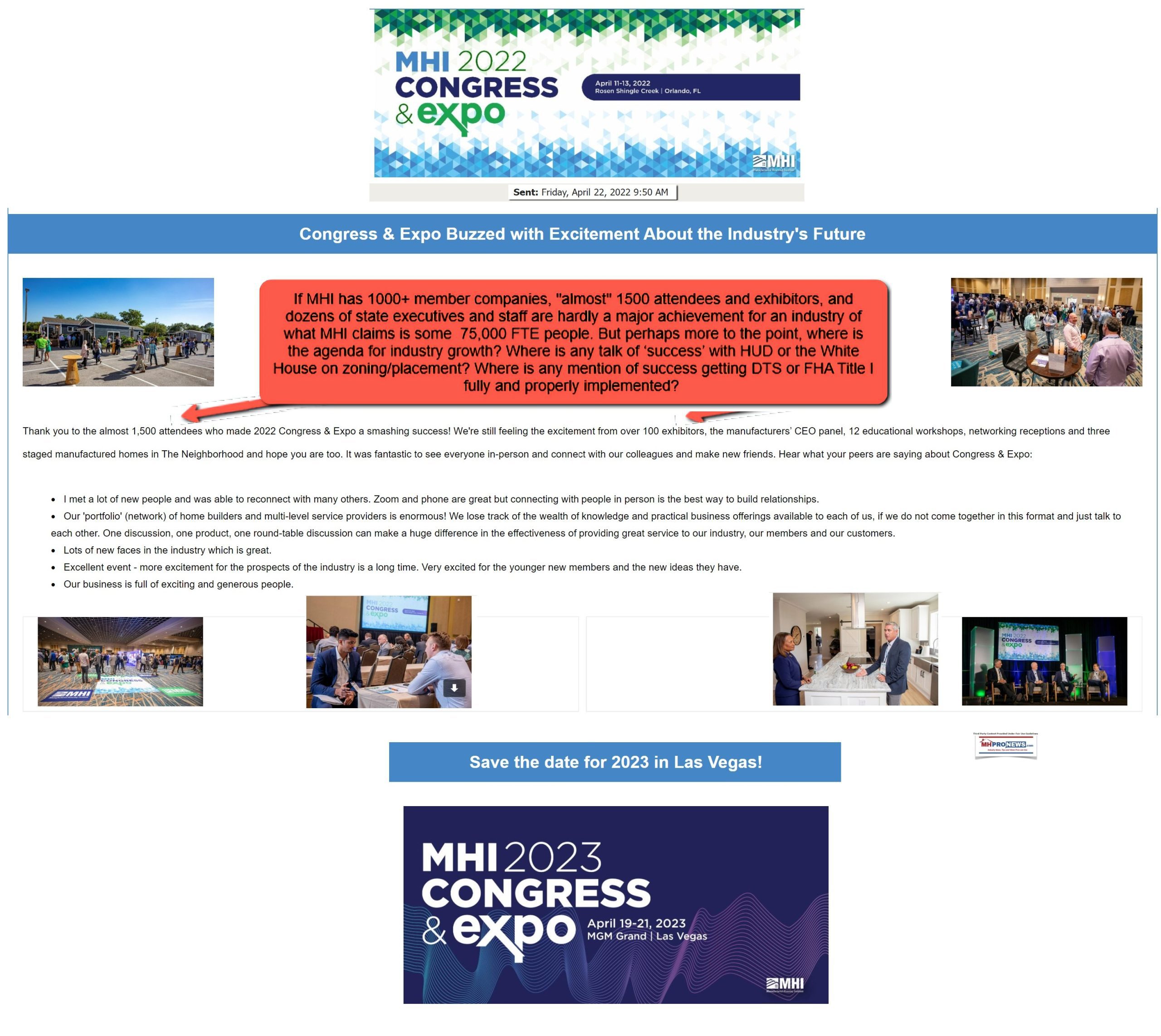
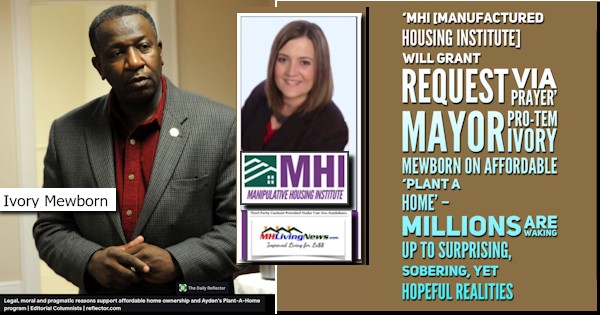

- 2) As to MHI and Fannie Mae, Freddie Mac loans available for retail customers on all HUD Code manufactured homes?
- A) Isn’t the short answer no? If not, why not? How does MHI reconcile what Tim Williams said in an MHI meeting with their claim that they want to get more lending?
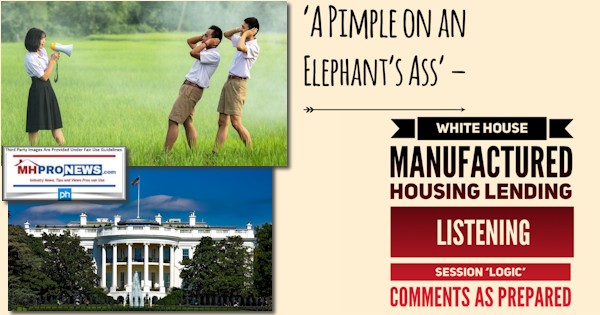
- 3) What progress has MHI made on FHA Title I loans readily available with terms and loan-limits that work in today’s environment? Is the notorious 10/10 rule still in place, limiting access to the FHA Title I program?
- A) When MHI’s CEO Lesli Gooch herself has said that there are only a few dozen such loans being made annually on a national basis, isn’t it obvious that serious topics like this discussed a decade or more ago are still just talking points for MHI?

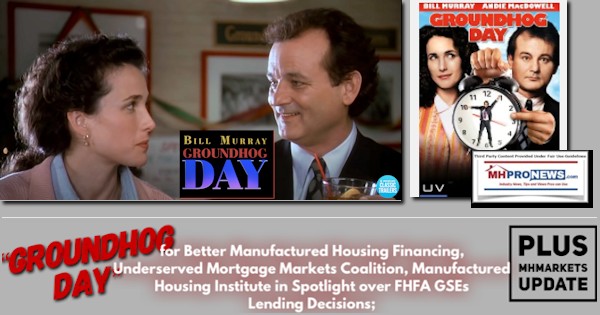
- 4) Perhaps even more notorious than zoning/placement and financing scenarios, if that is possible, is MHI’s behavior with respect to the DOE energy rule. Time and again, MHI has postured, flip-flopped, and finally revealed itself to be not just a back stabber, but more recently a front stabber too.
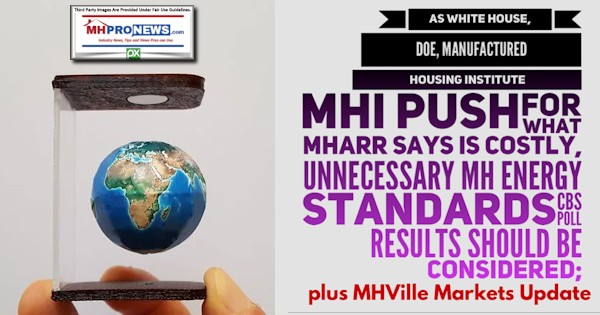

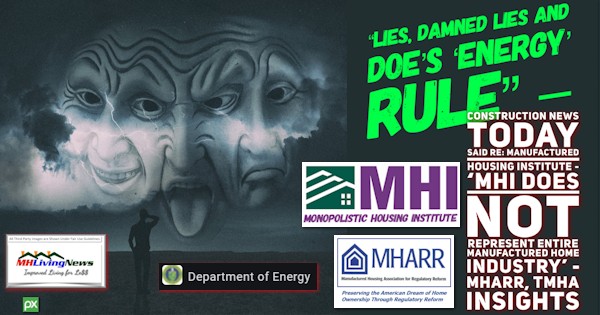
See the related reports for more information.
MHI leaders, as well as their outside attorneys, are periodically asked about these issues. Their standard response is ‘silence,’ which as the old saying goes, “silence betokens (indicates) consent.” That may not be constitutional law, but it is an ancient principle that may be applied.
When MHI’s own past and present members and teammates are quietly or openly ripping the organization for failures to preform, why are serious independents still giving them dues? Or has MHI become a protection racket? Or worse?
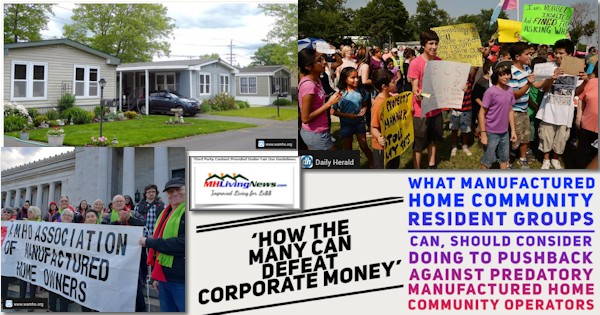
Why won’t MHI debate its performance?
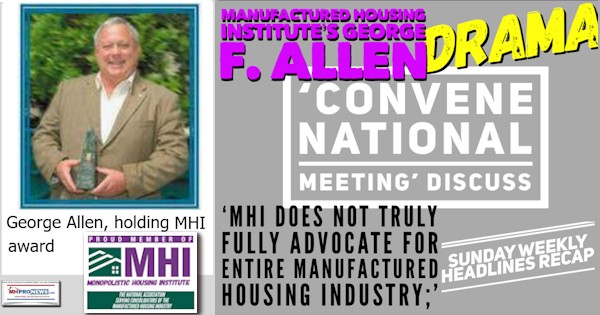
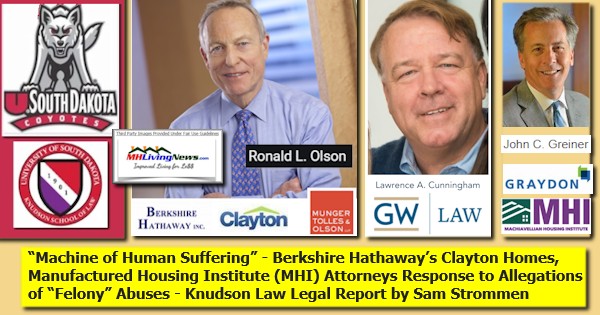

Why are clearly MHI and MHI-state association connected professionals the ones who have recently floated again creating a new post-production trade association? Isn’t it obviously because they have failed time and again to deliver measurable and meaningful outcomes?
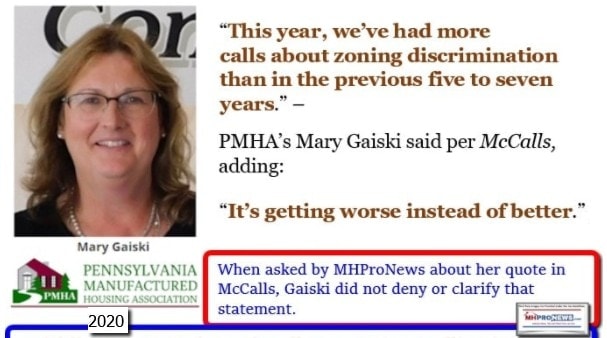

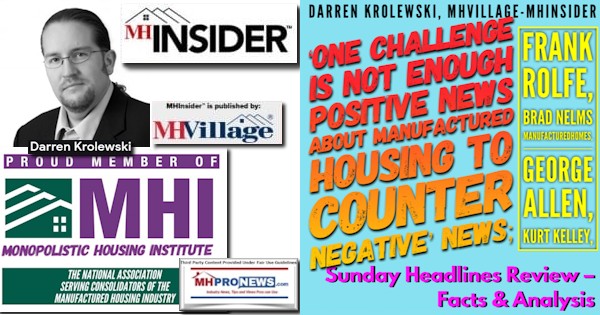
Further, MHI, MHI member brands, and state association efforts to ‘grow’ the industry have consitently failed. So, what is MHI bragging about – other than event turnout?

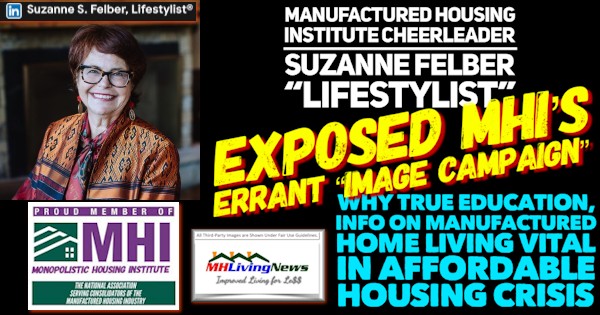
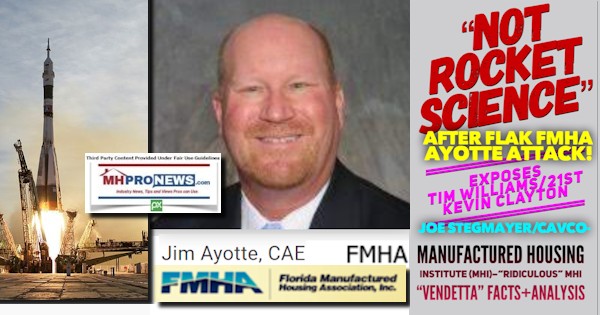
Meanwhile, parts of the manufactured home industry continues to steadily consolidate. Isn’t that the obviously desired ‘status quo’ that keeps the big boys engaged at MHI?

And isn’t consolidation – which networking events can facilitate – precisely the true reason why MHI is so into meetings with good turnouts? That and the fact that they are profit centers for MHI, per their own data?
They can dance, prance, and romance, but sooner or later even the blindest supporter of MHI will realize that the only progress made on the issues they claim to care about are despite MHI, not because of MHI. If not for MHARR’s work, would there still be any independent producers left in manufactured housing? While MHARR is not claiming to represent consumers or independent retailers, communities, etc. would they be in more precarious situations than they already are in MHARR didn’t exist?
MHARR stresses they have no plans to expand into other arenas. They will continue to represent producers – builders – of HUD Code manufactured homes. But they have also stressed their desire to see a post-production trade group(s) form that will give MHARR some organization to ‘team up with’ that can end the slow climb back to relevance post the 21st lending cut-off.
Facts can be nettlesome things. But nettles, properly understood and utilized, can be medicinal. No patient from a nagging illness recovers by ignoring reality.
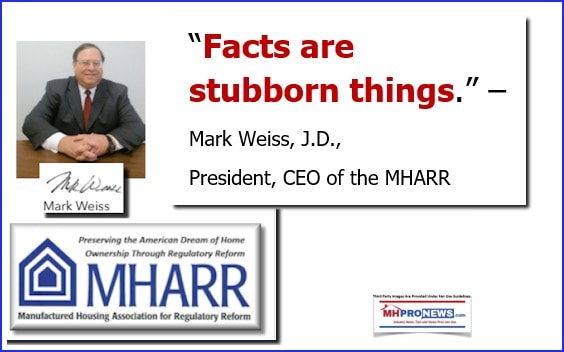
Only MHProNews/MHLivingNews present the good news about manufactured housing’s potential along side the sobering reality checks – like this one – as to why manufactured housing is still struggling at perhaps 30 percent or so of its last highwater mark.
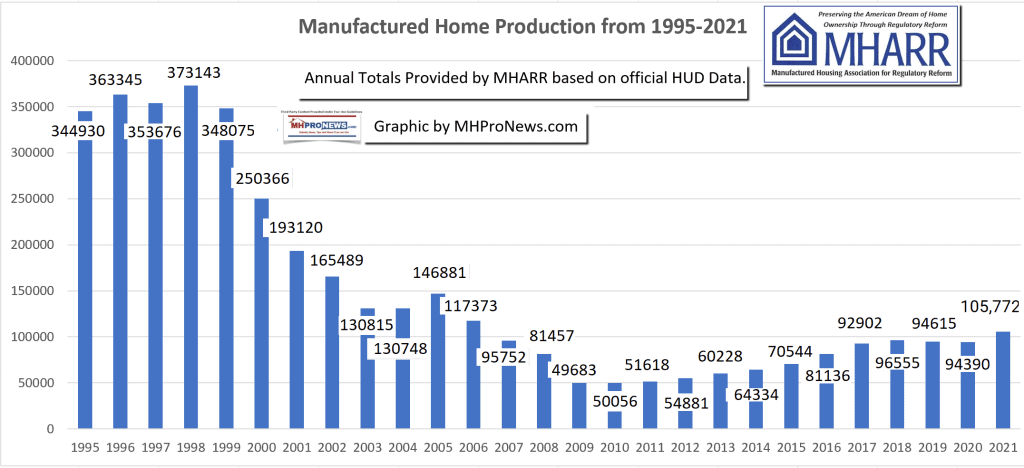
MHProNews and our sister site began pressing MHI while we were still MHI members. Despite MHI’s claims to be open to dissent, that proved to be just another brazen but nice sounding lie in our case, wasn’t it?
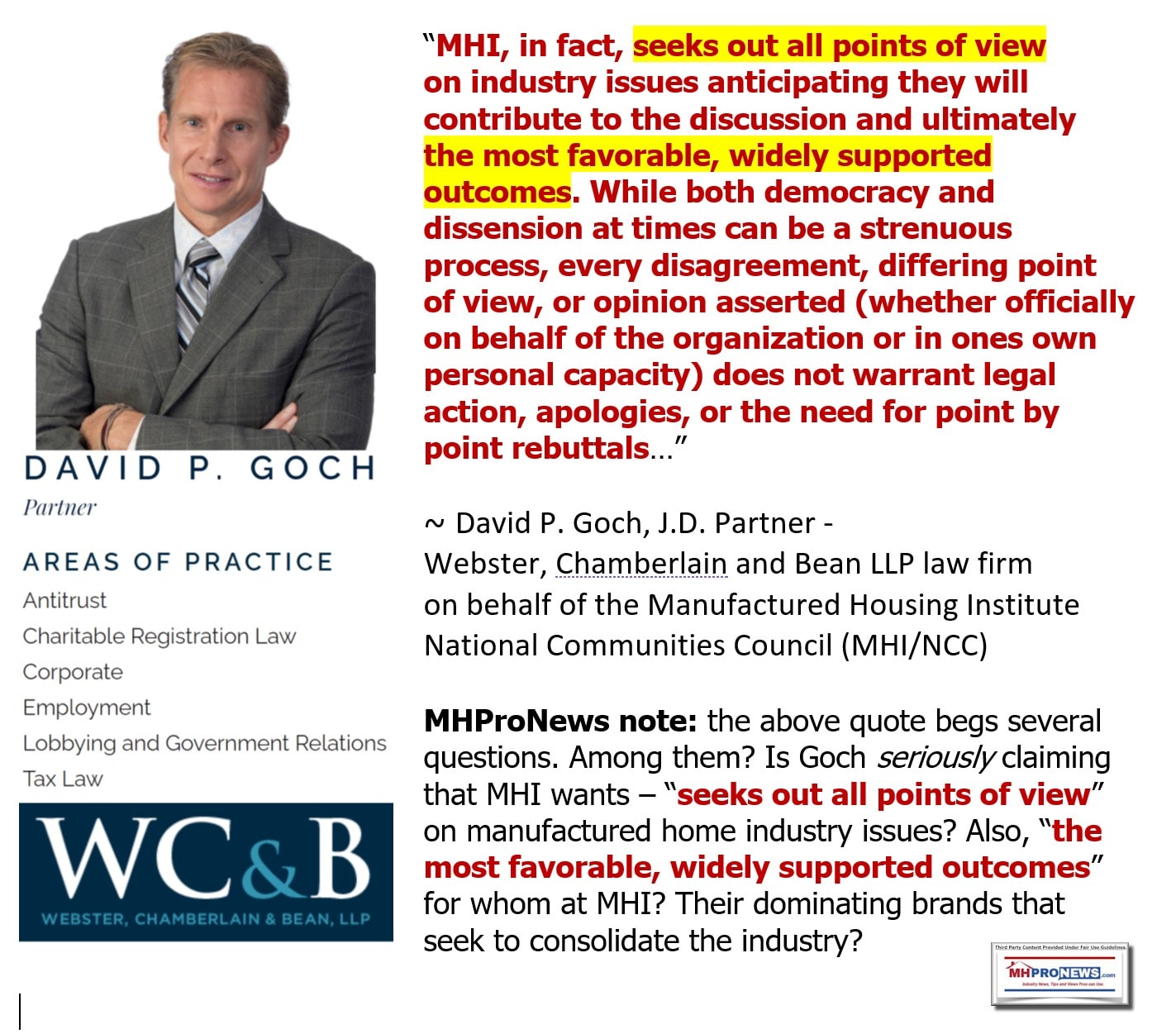
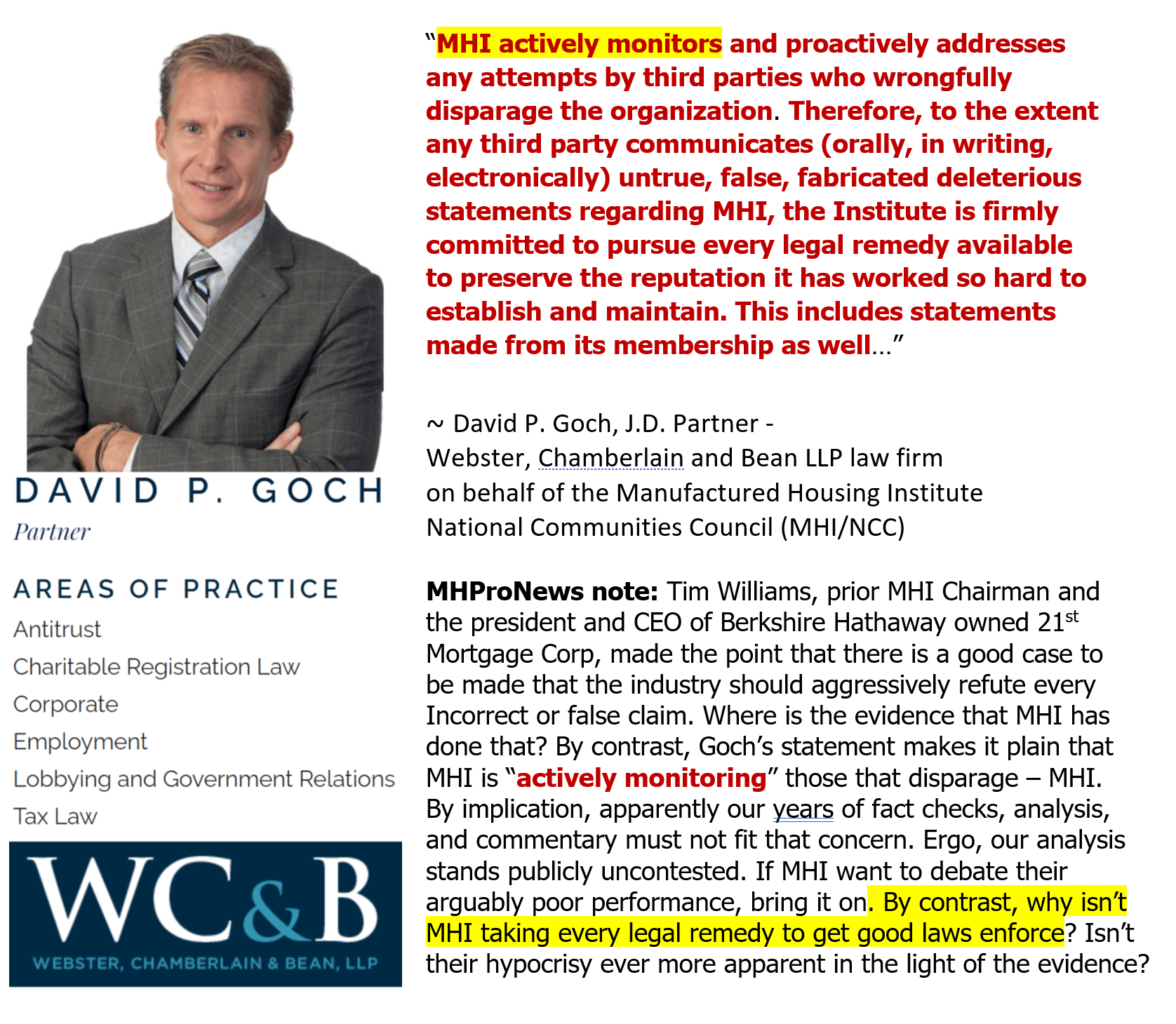
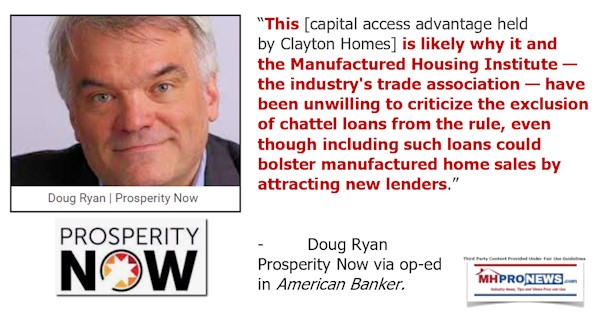
Why didn’t MHI even allow their state association affiliates to team up with MHARR to overcome zoning and placement barriers during the Trump Administration?
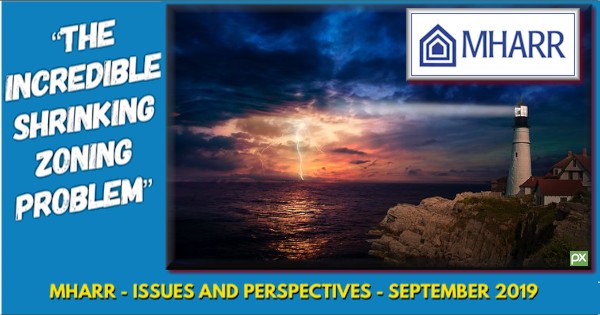
The realities above and linked are reason enough for long-term thinkers in our industry who are producers to be involved with MHARR. These are also reasons why those in the post-production sector should quietly organize. Because even kiss-derrière brownnosers and gameplayers realize that there are reasons why frustration with MHI exists. For evidence of that, see the report linked here.
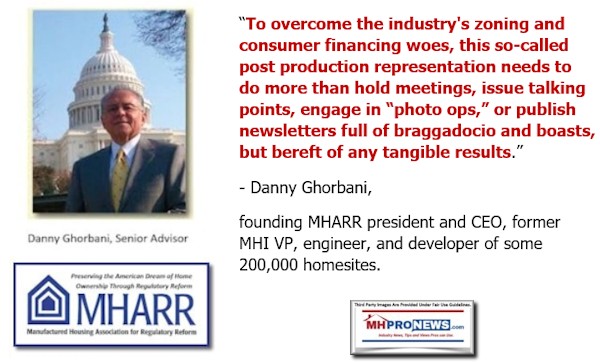
Tick-tock, tick-tock. Something is bound to give, because people will put up with lies, deception, and general BS only so long, especially when their pocketbooks and futures depend on fighting back.
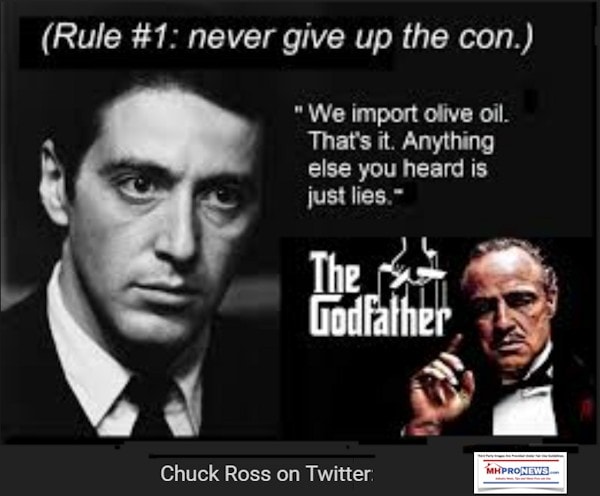

Next up is our daily business news recap of yesterday evening’s market report, related left-right headlines, and manufactured housing connected equities.
The Business Daily Manufactured Home Industry Connected Stock Market Updates. Plus, Market Moving Left leaning CNN and Right-leaning (Newsmax) Headlines Snapshot. While the layout of this daily business report has been evolving over time, several elements of the basic concepts used previously are still the same. For instance. The headlines that follow below can be reviewed at a glance to save time while providing insights across the left-right media divide. Additionally, those headlines often provide clues as to possible ‘market-moving’ news items.
Market Indicator Closing Summaries – Yahoo Finance Closing Tickers on MHProNews…
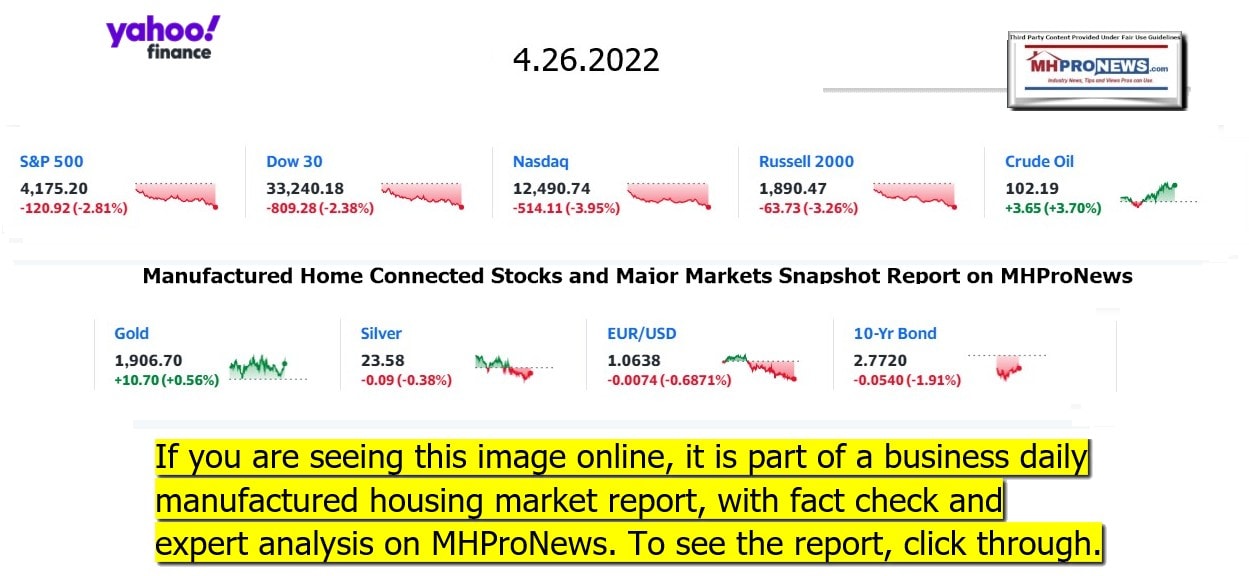
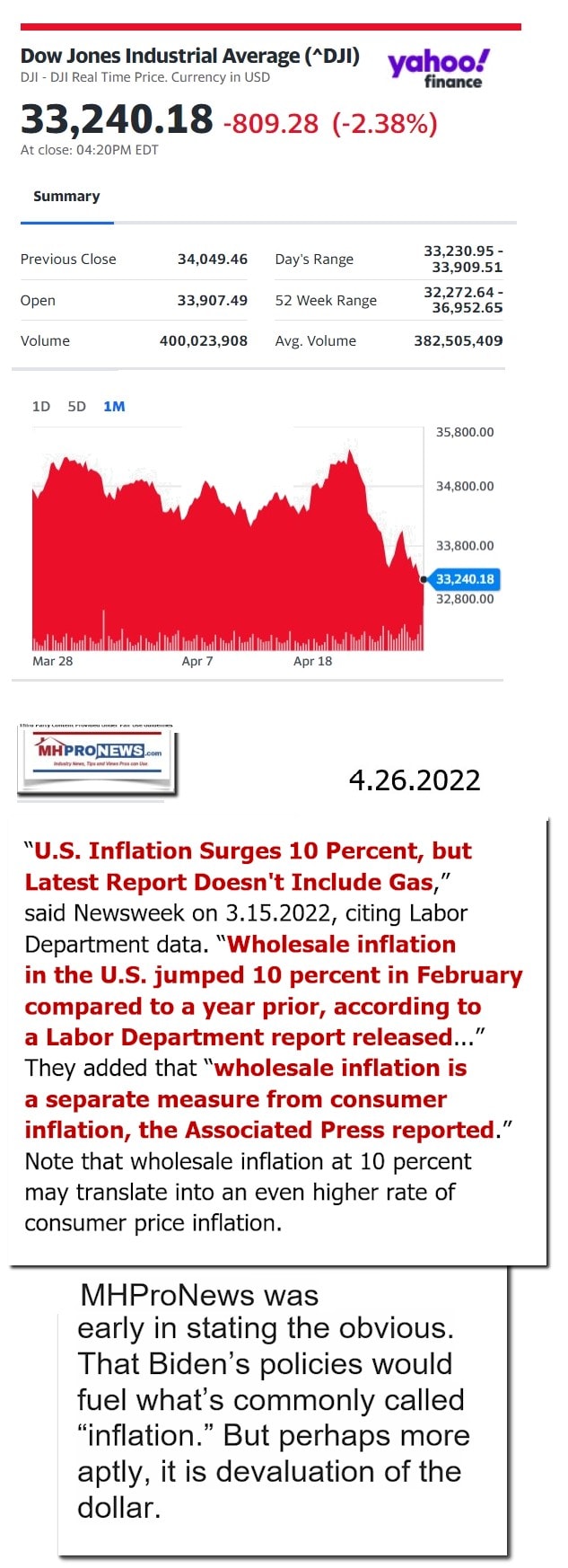
Headlines from left-of-center CNN Business – from the evening of 4.26.2022
- High stakes
- Elon Musk gestures as he speaks during a press conference at SpaceX's Starbase facility near Boca Chica Village in South Texas on February 10, 2022. Billionaire entrepreneur Elon Musk delivered an eagerly-awaited update on SpaceX's Starship, a prototype rocket the company is developing for crewed interplanetary exploration.
- Elon Musk’s bid to buy Twitter has the potential to reshape the internet as we know it
- Taking a cut: The big winner in Elon Musk’s Twitter deal
- Wall Street: Much of Elon Musk’s Twitter deal is still a mystery
- Jack Dorsey reacts: ‘Elon is the singular solution I trust’
- LIVE UPDATES Jeff Bezos has some questions aout the Twitter deal
- INTERACTIVE: Here’s what Elon Musk has tweeted over the years … about Twitter
- Late night: Hosts joke about Musk’s Twitter takeover
- Stelter: Eight questions about Twitter’s future now
- Discourse: Twitter has been focused on ‘healthy conversations.’ Elon Musk could change that
- On the ground: What happened inside Twitter after the news
- Truth Social: Trump SPAC is down 44% since Musk disclosed Twitter stake
- NEW YORK, NEW YORK – APRIL 25: The Fearless Girl statue stands nearly alone in front of the New York Stock Exchange near Wall Street during the coronavirus pandemic on April 25, 2020 in New York City. COVID-19 has spread to most countries around the world, claiming over 200,000 lives with infections close to 2.9 million people. (Photo by Justin Heiman/Getty Images)
- Dow plunges 800 points as recession fears heat up
- A major downturn is coming, Deutsche Bank warns
- Morgan Stanley warns of potential bear market
- US home prices just jumped by nearly 20%
- Palm oil is in half your groceries. Here’s why prices might shoot up
- How the Senate could change your 401(k) plan
- Fidelity will soon offer bitcoin as an option in 401(k)s
- Ford F-150 Lightning electric pickup begins crucial product launch
- SpaceX to launch another historic astronaut mission tomorrow
- David Zaslav takes on Netflix in his first earnings call for Warner Bros. Discovery
- The Chevrolet Corvette is officially going electric
- Amazon’s proposed new building looks like this emoji
- Opinion: Millions more Americans will go hungry if Congress doesn’t act soon
- STREAMING
- (L to R) Simone Ashley as Kate Sharma, Jonathan Bailey as Anthony Bridgerton, Charithra Chandran as Edwina Sharma in episode 203 of Bridgerton. Cr.
- Netflix may clamp down on password sharing. Here’s what that means
- Netflix introduces new way to recommend content
- CNN+ will shut down at the end of April
- The Obamas and Spotify won’t ink a new podcasting deal
- Streaming services take a hit as inflation forces Brits to choose
- COCA-COLA
- Gaming fans play “Fortnite” at the 2019 Electronic Entertainment Expo, also known as E3, opening in Los Angeles, California on June 11, 2019. Gaming fans and developers gather, connecting thousands of the brightest, best and most innovative in the interactive entertainment industry and a chance for many to preview new games.
- Coke’s new ‘Pixel’ flavor first appeared in Fortnite
- Coca-Cola leaves Russia
- Coke’s latest flavor is here. And it’s a weird one
- Meet the superfans trying to save Tab
- Coca-Cola introduces a first-of-its-kind flavor
Headlines from right-of-center Newsmax 4.26.2022
- AG Garland: Biden Has Not Interfered With Fraud Inquiry Into Son Hunter
- Russian Invasion of Ukraine
- US, Allies Vow Heavy Arms for Ukraine, Shrug Off Russian Nuke Warning
- Putin Agrees to UN, Red Cross Help to Evacuate Civilians From Mariupol Steel Plant
- Milley: Russia Needs to Pay for Attacking Ukraine
- Ukraine Woman, 77, Braves Invasion to Save Animals
- Polish Officials: Russia Suspending Gas Supplies over Rubles
- UK: Ukraine Can Strike Within Russia
- Nuclear Chief: Russia’s Chernobyl Seizure Risked Accident
- Reports of Russian Concentration Camps, Demands for Money
- Biden Admin. Pushed Germany to Delay Russian Oil Ban Until After Midterms
- Polish PM: Poland Has Delivered Tanks to Ukraine
- Defense Secretary Austin: US Wants ‘to See Russia Weakened’
- Russia Warns of WWIII After Top US Officials Visit Kyiv
- More Russian Invasion of Ukraine
- Newsmax TV
- Fallon: ‘Great News’ for Judge to Block Ending Title 42
- Cammack: DeSantis ‘Fighting the Good Fight’ For Florida
- Babin to Newsmax: Mayorkas Must Go If He Won’t Protect Border
- Randy Weber: Biden Bears ‘Some Responsibility’ in Guardsman’s Death
- Rob O’Neill: Al-Qaida Intel Showed Plans for More Attacks
- Gov. Ricketts: Lack of Title 42 Creates ‘Huge Security Issue’
- Ben Carson: ‘Disturbing’ Fauci Questioned Court’s Mask Ruling | video
- More Newsmax TV
- Newsfront
- Big Tech Companies Duped Into Providing Data Used to Sexually Extort Minors
- Numerous Big Tech companies have been duped into providing customers’ sensitive personal information that was used to harass and even sexually extort minors, according to federal law enforcement officials and industry investigators…. [Full Story]
- AG Garland: President Biden Has Not Interfered With Son’s Fraud Investigation
- Attorney General Merrick Garland defended President Joe Biden on [Full Story]
- 6 Defendant Claims Swinging Flagpole Showed ‘Restraint’
- The fourth Jan 6 Capitol attack defendant to face a jury trial is [Full Story]
- Jeff Bezos Suggests Chinese Influence Behind Elon Musk’s Twitter Purchase
- Amazon founder and executive chairman Jeff Bezos raised the specter [Full Story]
- Related
- JD Vance: Twitter ‘a Very Small Part’ of ‘Big Tech Problem’
- Mark Levin Returns to Twitter, Cites New Ownership
- Trump Says He Won’t Return to Musk-Owned Twitter
- Twitter Tells Staff Their Jobs Are Safe for 6 Months Until Musk Takes Over
- Twitter Thwarts Potential ‘Rogue’ Employees With Product Changes Ban
- Former Twitter CEO Jack Dorsey: Elon Musk “Is the Singular Solution I Trust”
- AJC Poll: Kemp Trouncing Perdue in GOP Primary
- Georgia Gov. Brian Kemp holds a substantial lead in the Republican [Full Story]
- US, Allies Vow Heavy Arms for Ukraine, Shrug Off Russian Nuke Warning
- The United States and its allies promised to send more heavy weaponry [Full Story]
- Biden Focus on ‘Ghost Guns’ Lets Criminals Off the Hook
- The latest boogeyman in President Joe Biden’s quest for more [Full Story] | Platinum Article
- Ukrainian Woman, 77, Braves Invasion to Save Hundreds of Animals
- Asya Serpinska, 77, braved the Russian invasion of Ukraine and saved [Full Story]
- China Denies It’s Hoarding Food, but Facts Show Otherwise
- Beijing residents are flooding supermarkets amid fears they’ll soon [Full Story] | Platinum Article
- Symptoms of Sudden Liver Disease Outbreak in Kids
- A puzzling outbreak of sudden liver disease in nearly 200 children [Full Story]
- McCarthy: Impeachment Possible for Homeland Security Secretary Mayorkas
- Minority Leader Kevin McCarthy, R-Calif., suggested to fellow [Full Story]
- Related
- Babin to Newsmax: Mayorkas Must Go If He Won’t Protect Border
- Judge Blocks Biden From Ending Title 42 at Border
- Supreme Court to Hear ‘Remain in Mexico’ Case Tuesday
- Survey: 51% Say Biden Admin Encouraging Illegal Immigration
- Defense Secretary Austin: Supporting Nations to Meet on Ukraine War Monthly
- A group of more than 40 countries will start meeting monthly to [Full Story]
- Despite Lockdowns, Chinese Premier Wants GDP to Outpace US
- With a COVID-19 outbreak in China causing lockdowns and economic [Full Story]
- CDC: Nearly 60% of US Population Had COVID by February
- By February of this year, 58% of the US population – or more than 190 [Full Story]
- US Panel Identifies Russia, 14 Other Nations for State Dept. Watch List
- A U.S. panel recommended the State Department designate Russia, [Full Story]
- Biden Admin. Pushed Germany to Delay Russian Oil Ban Until After Midterms
- Germany’s decision to not immediately end Russian oil imports – a [Full Story]
- ADL: Antisemitic Incidents Reach Record High in 2021
- Anannual audit commissioned by the Anti-Defamation League finds the [Full Story]
- Washington Bans Word ‘Marijuana’ Because It’s ‘Racist’
- The state of Washington will ban the word “marijuana” from being used [Full Story]
- Sasse Demands Russia Be Removed From Interpol
- In the face of Russia’s continuing attack on Ukraine, Sen. Ben Sasse, [Full Story]
- Trump Touts Truth Social #1 on App Store
- Former President Donald Trump released a graphic Tuesday showing his [Full Story]
- Trump: JD Vance ‘a Guy That Said Some Bad S**t About Me’
- Stumping for Ohio GOP Senate primary candidate J.D. Vance, former [Full Story]
- VP Harris Tests Positive for COVID-19
- Vice President Kamala Harris has tested positive for COVID-19, the [Full Story]
- House GOP Wants Wuhan Mice Experiments Probed for Cover-Up, Fraud
- Republicans on the House Energy and Commerce Committee (E&C) are [Full Story]
- Rubio Rips ‘Cultural Marxists’
- Marco Rubio, R-Fla., said “cultural marxists are freaking out [Full Story]
- DeSantis Concerned About California Exodus; Calls San Francisco ‘Dumpster Fire’
- Ron DeSantis, R-Fla., said people and companies leaving [Full Story]
- Franklin Graham Lauds DeSantis, Slams Disney
- Franklin Graham has praised Florida Gov. Ron DeSantis, R-Fla., for [Full Story]
- Joe Rogan Claims He Gained 2M Subscribers Following Spotify Controversy
- Calls to cancel Joe Rogan appear to have been futile. The “Joe Rogan [Full Story]
- Russian Security Appears to Confuse ‘The Sims’ With SIM Cards in ‘Assassination’ Sting
- Russian security personnel reportedly listed confiscated “The Sims” [Full Story]
- Medical ‘Negligence’ Killed New Jersey Navy SEAL: Mother
- The Navy’s medical “negligence” resulted in the death of Kyle Mullen, [Full Story]
- Shaun King Condemns Elon Musk Twitter Takeover as ‘About White Power’
- Civil rights activist Shaun King said this week that Twitter’s sale [Full Story]
- UK: Ukraine Can Strike Within Russia
- Great Britain says Ukraine has the right to attack targets inside [Full Story]
- How to Find the Top Advisors in the Nation
- SmartAsset
- More Newsfront
- Finance
- Despite Lockdowns, Chinese Premier Wants GDP to Outpace US
- With a COVID-19 outbreak in China causing lockdowns and economic disruption, China’s economy is slowing. Official data reveal that China’s economy expanded in the first quarter, but lockdowns in major cities affected trade, retail spending, and factory output in March…. [Full Story]
- Deutsche Bank Foresees Deep But Brief Recession in 2023
- Ford Juices Production of Lightning F-150 Electric Truck
- New GM Union in Mexico Seeks 19.2% Wage Hike in Historic Talks
- WV Sen Rupie Philips: Banking Bill Is About Free Energy Markets
- More Finance
- Health
- CDC: Nearly 60 Percent of US Population Had COVID by February
- By February of this year, 58% of the US population – or more than 190 million people – had been infected with COVID, according to an antibody survey carried out by the Centers for Disease Control and Prevention (CDC) published Tuesday. The figure is far higher than the 80…… [Full Story]
- Task Force Now Recommends Against Heart Preventive Daily Aspirin for Over 60
- What is Known About the Fast-Spreading New Omicron Variant
- Experimental Pill Taken Before Sex May Prevent Pregnancy for Days
- Calcium Supplements Linked to Increased Risk for Heart-Related Death
MHProNews has pioneered in our profession several reporting elements that keep our regular and attentive readers as arguably the best informed in the manufactured housing industry. Among the items shared after ‘every business day’ (when markets are open) is our left-right headline recap summary. At a glance in two to three minutes, key ‘market moving’ news items are covered from left-of-center CNN Business and right-of-center Newsmax. “We Provide, You Decide.” © Additionally, MHProNews provides expert commentary and analysis on the issues that others can’t or won’t cover that help explain why manufactured housing has been underperforming during the Berkshire era while an affordable housing crisis and hundreds of thousands of homeless in America rages on. These are “Industry News, Tips, and Views Pros Can Use” © features and others made and kept us the runaway #1 in manufactured housing trade publisher for a dozen years and counting.

Manufactured Housing Industry Investments Connected Equities Closing Tickers
Some of these firms invest in manufactured housing, or are otherwise connected, but may do other forms of investing or business activities too.
-
-
-
-
-
-
-
-
-
-
-
-
-
- NOTE: The chart below includes the Canadian stock, ECN, which purchased Triad Financial Services, a manufactured home industry lender
- NOTE: Drew changed its name and trading symbol at the end of 2016 to Lippert (LCII).
- NOTE: Deer Valley was largely taken private, say company insiders in a message to MHProNews on 12.15.2020, but there are still some outstanding shares of the stock from the days when it was a publicly traded firm. Thus, there is still periodic activity on DVLY.
-
-
-
-
-
-
-
-
-
-
-
-


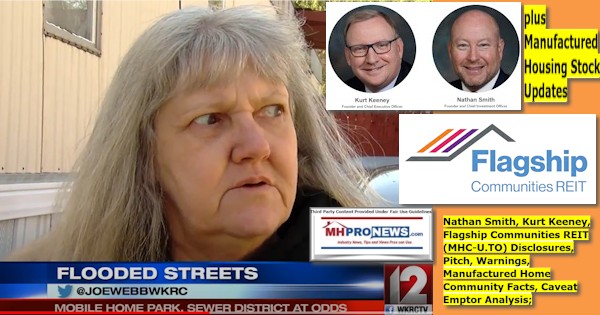
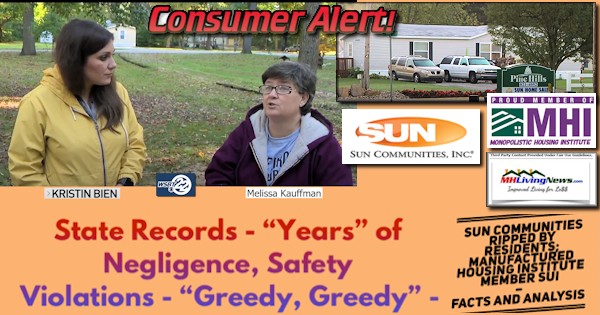

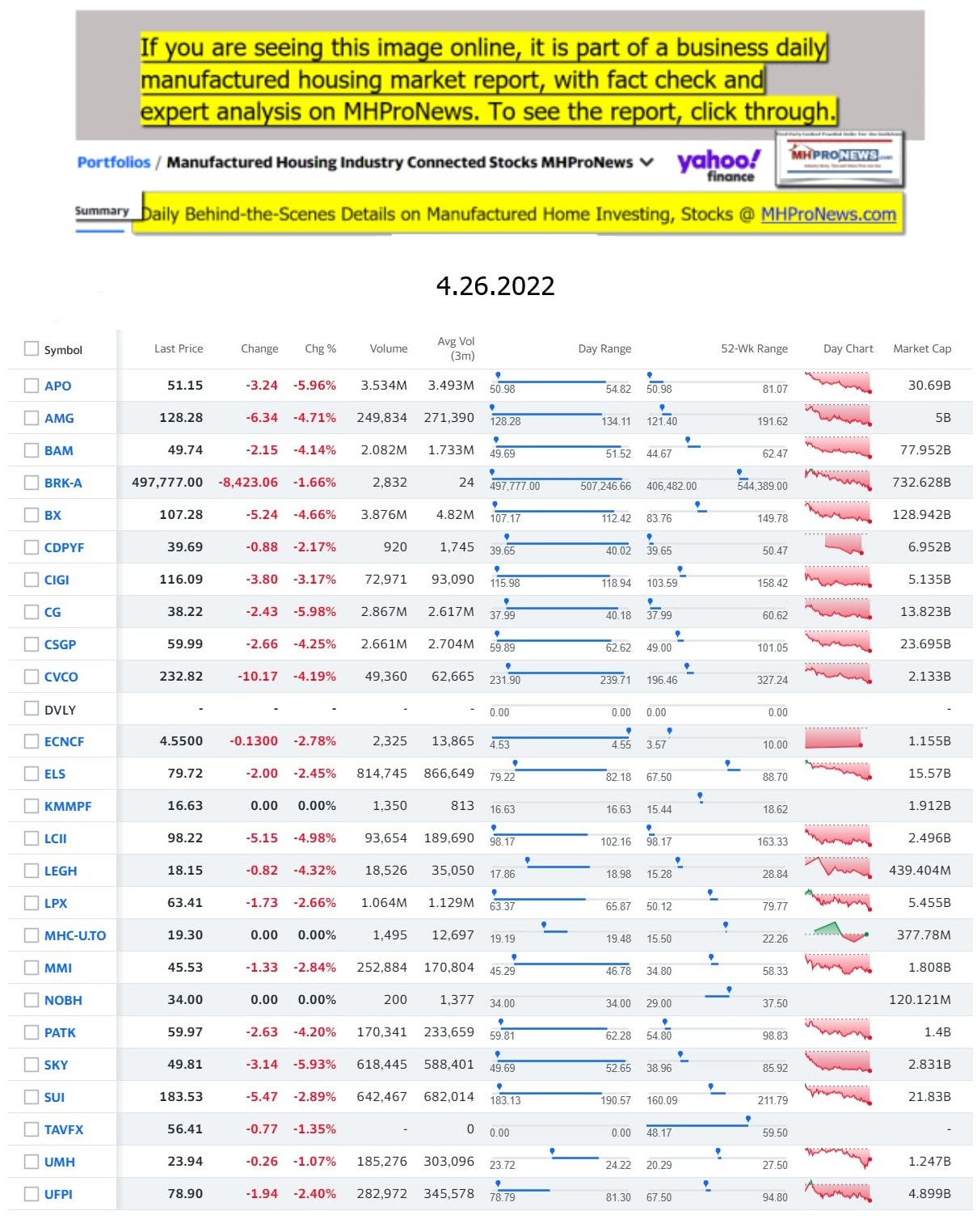
-
- 2022 …Berkshire Hathaway is the parent company to Clayton Homes, 21st Mortgage, Vanderbilt Mortgage and other factory-built housing industry suppliers.
· LCI Industries, Patrick, UFPI, and LP each are suppliers to the manufactured housing industry, among others.
· AMG, CG, and TAVFX have investments in manufactured housing related businesses. For insights from third-parties and clients about our publisher, click here.
Enjoy these ‘blast from the past’ comments. MHProNews. MHProNews – previously a.k.a. MHMSM.com – has celebrated our 11th year of publishing and have completed over a dozen years of serving the industry as the runaway most-read trade media.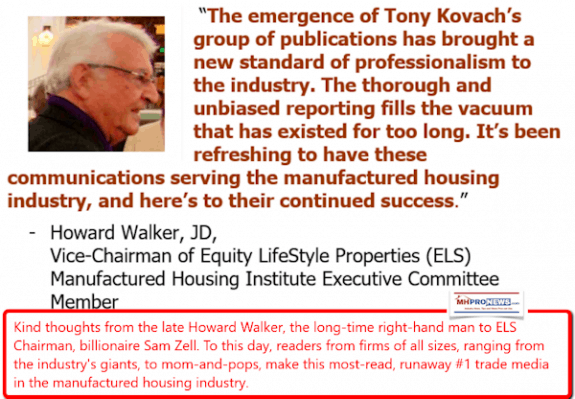
- 2022 …Berkshire Hathaway is the parent company to Clayton Homes, 21st Mortgage, Vanderbilt Mortgage and other factory-built housing industry suppliers.
Sample Kudos over the years…
It is now 12+ years and counting…
Learn more about our evolutionary journey as the industry’s leading trade media, at the report linked below.
· For expert manufactured housing business development or other professional services, click here.
· To sign up in seconds for our industry leading emailed headline news updates, click here.
Disclosure. MHProNews holds no positions in the stocks in this report.
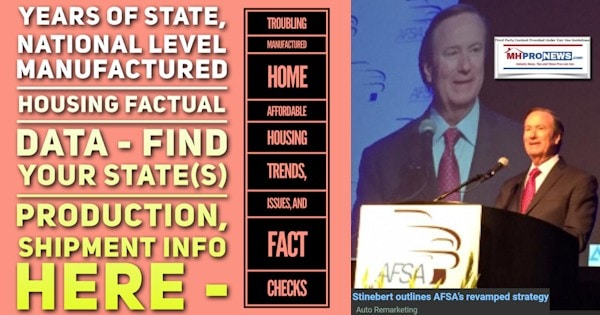


That’s a wrap on this installment of “News Through the Lens of Manufactured Homes and Factory-Built Housing” © where “We Provide, You Decide.” © (Affordable housing, manufactured homes, stock, investing, data, metrics, reports, fact-checks, analysis, and commentary. Third-party images or content are provided under fair use guidelines for media.) (See Related Reports, further below. Text/image boxes often are hot-linked to other reports that can be access by clicking on them.)

By L.A. “Tony” Kovach – for MHProNews.
Tony earned a journalism scholarship along with numerous awards in history. There have been several awards and honors and also recognition in manufactured housing. For example, he earned the prestigious Lottinville Award in history from the University of Oklahoma, where he studied history and business management. He’s a managing member and co-founder of LifeStyle Factory Homes, LLC, the parent company to MHProNews, and MHLivingNews.com. This article reflects the LLC’s and/or the writer’s position and may or may not reflect the views of sponsors or supporters.

